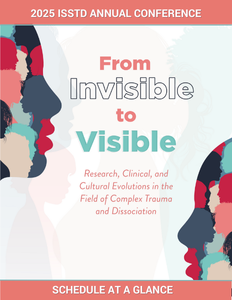Back
Posters
Poster Judging Hour
Witnessing Childhood Trauma and Impulse Control: The Crucial Role of Dissociation
Friday, March 14, 2025
6:00 PM – 7:00 PM US Eastern Time
- AM
Audrey Mason, MA
Clinical Psychology Doctoral Student
Long Island University - Brooklyn - KE
Abstract
Childhood trauma is widely recognized for its contribution to emotional difficulties and impulsivity (van der Kolk et al., 2005; Kim & Choi, 2020), but witnessing traumatic events in childhood specifically may have unique effects that remain underexplored (Wolf & Prabhu, 2021). Witnessing violence in childhood has been linked to negative outcomes (Kolbo et al., 1996), though often confounded by other forms of abuse. Dissociation also leads to behavioral difficulties by hampering the ability to integrate traumatic experiences and reflect on emotions (Berthelot et al., 2012). This study examined whether dissociation explained the relationship between witnessing traumatic events in childhood and impulse control.
This study used a sample of 100 ethnically diverse adults (M = 20.20 years, 81.6% female) at a New York City university. Participants completed self-reports on childhood trauma (Traumatic Antecedents Questionnaire), dissociation (Multiscale Dissociation Inventory), and impulse control (Difficulties in Emotion Regulation Scale). A path analysis was conducted to test the mediation while controlling for physical abuse and neglect. Witnessing trauma significantly predicted greater dissociation (β = 0.487, p < .001), which in turn predicted poorer impulse control (β = 0.28, p = .008). Dissociation fully mediated the relationship between witnessing trauma and impulse control: the direct effect of witnessing trauma on impulse control was not significant (β = 0.17, p = .103) and the indirect effect through dissociation was significant (β = 0.14, 95% CI [0.23, 2.4], p = .017).
Findings show that dissociation mediates the relationship between witnessing trauma and impulse control. The effect of witnessing on impulse control was evident only through dissociation, emphasizing dissociation’s critical role in behavioral dysregulation after exposure to trauma. These results highlight the need to address dissociation in trauma-focused interventions and underscore the impact of witnessing traumatic events in childhood, even in the absence of neglect or physical abuse.
Childhood trauma is widely recognized for its contribution to emotional difficulties and impulsivity (van der Kolk et al., 2005; Kim & Choi, 2020), but witnessing traumatic events in childhood specifically may have unique effects that remain underexplored (Wolf & Prabhu, 2021). Witnessing violence in childhood has been linked to negative outcomes (Kolbo et al., 1996), though often confounded by other forms of abuse. Dissociation also leads to behavioral difficulties by hampering the ability to integrate traumatic experiences and reflect on emotions (Berthelot et al., 2012). This study examined whether dissociation explained the relationship between witnessing traumatic events in childhood and impulse control.
This study used a sample of 100 ethnically diverse adults (M = 20.20 years, 81.6% female) at a New York City university. Participants completed self-reports on childhood trauma (Traumatic Antecedents Questionnaire), dissociation (Multiscale Dissociation Inventory), and impulse control (Difficulties in Emotion Regulation Scale). A path analysis was conducted to test the mediation while controlling for physical abuse and neglect. Witnessing trauma significantly predicted greater dissociation (β = 0.487, p < .001), which in turn predicted poorer impulse control (β = 0.28, p = .008). Dissociation fully mediated the relationship between witnessing trauma and impulse control: the direct effect of witnessing trauma on impulse control was not significant (β = 0.17, p = .103) and the indirect effect through dissociation was significant (β = 0.14, 95% CI [0.23, 2.4], p = .017).
Findings show that dissociation mediates the relationship between witnessing trauma and impulse control. The effect of witnessing on impulse control was evident only through dissociation, emphasizing dissociation’s critical role in behavioral dysregulation after exposure to trauma. These results highlight the need to address dissociation in trauma-focused interventions and underscore the impact of witnessing traumatic events in childhood, even in the absence of neglect or physical abuse.

